Winter is perhaps the most beautiful time of the year - a cold breeze, winter festivals, and weddings. It is no wonder this season is so special. But it also brings along an unwanted guest - the winter dandruff. A dry flaky scalp is a common issue faced in this season. The dry winter air often strips out the natural moisture of the scalp leading to dandruff. Itchy scalp and flakes on the shoulder are common yet embarrassing situations many have to deal with. But fear not, flake fighters, we are here to help you. In this blog, let’s check out how to avoid dandruff in winter.
Understanding The Causes of Dandruff in Winter
Often we mistake dandruff for a dry skin condition. However, the causes of dandruff in winter could be varied. Let us look at some of the common causes of winter dandruff.
#1 Malassezia
Yeast buildup on the scalp can lead to dandruff. Malassezia is a naturally causing yeast on the scalp that thrives on an oily scalp. An unclean scalp or not washing your hair often can lead to yeast buildup and subsequently dandruff. (1)
#2 Dry Skin
Dry weather strips off the natural oils in the skin and the scalp. This leads to dryness and flakiness of the scalp. The dryness is a major cause of itchy scalp and winter dandruff.
#3 Seborrheic Dermatitis
Seborrheic dermatitis is a noncontagious inflammatory skin condition that results in greasy, itchy and patchy skin. Areas of the skin with more oil glands like the scalp, face, back, and upper back are more prone to developing this condition. (2) This skin condition could be a major factor for experiencing increased winter dandruff.
#4 Irritants in Hair Care Products
Harsh chemicals in hair care products like alcohol, SLS (sodium lauryl sulfate), paraben, artificial fragrances, harsh detergents, and other preservatives can lead to winter dandruff. These chemicals often further dry out the scalp causing inflammation and flaking of the scalp.
How to Avoid Dandruff in Winter
Now that we have learned the major causes of winter dandruff, let's see how we can live dandruff-free this winter. Here are some tips on how to avoid dandruff in winter.
Choose The Right Shampoo
Washing your hair and keeping the scalp clean is one of the best ways to avoid dandruff in winter. But which shampoo should you use? Look for anti-dandruff shampoos that are specially formulated with dandruff-reducing ingredients like salicylic acid or D- Panthenol. While salicylic acid is an exfoliant, D- Panthenol hydrates the hair strands.
Avoid Shampoos With Harsh Chemicals
Chemicals and preservatives in shampoos can lead to dry scalp and winter dandruff. Avoid shampoos with SLS, and paraben. Opt for gentle shampoos and conditioners.
Wash Scalp Regularly
Not washing the scalp not only increases the chances of yeast infection and build-up but also makes your scalp greasy and smelly. Aim for at least 2-3 washes a week. But remember, overwashing can also dry out your scalp. Avoid washing your hair every day.
Use Conditioner Only At Lengths of Hair
A useful tip on how to avoid dandruff in winter is to understand the right ways to use a hair conditioner. A conditioner aims to moisturise and hydrate the hair strands. Avoid using conditioner on the scalp. Apply conditioner only on the lengths of the hair till the tip. Using conditioner on the scalp can clog pores and worsen oil production on the scalp.
Hydrate Hydrate Hydrate
We know it is winter, but not having an adequate amount of water in winter can also lead to dry skin. Drink at least 2 litres of water to stay hydrated from within.
Include Healthy Fats in Your Diet
A balanced diet is key to a healthy lifestyle. Fruits and nuts with healthy fats like walnuts, flax seeds, and pumpkin seeds ensure you are hydrated and have strong hair.
Avoid Processed Foods
Consuming certain foods like, processed and refined foods can lead to skin flare-ups. Avoid these foods to reduce the chances of increased dandruff in winter.
-
Refined flour
-
Fast food
-
Oily deep-fried foods
-
Sugary juices
Reduce Stress
When you want to learn how to avoid dandruff in winter, you can never overlook the impact of stress on hair and skin. Stress can exacerbate skin conditions including dandruff and hair fall. Practice stress-reducing techniques like yoga, meditation, or deep breathing exercises.
Home Remedies for Dandruff
Let us also check how to avoid dandruff in winter using simple home remedies.
-
Apple Cider Rinse - Mix 1 part of apple cider vinegar with 1 part of water. Apply this mixture to the scalp after shampooing your hair. Rinse thoroughly.
-
Hot Oil Massage - Add a few drops of tea tree essential oil to warm coconut oil and massage your scalp. Apply a hot towel and wrap your hair for 10 minutes. Wash your hair using an anti-dandruff shampoo.
-
Lemon Rub - Mix a few drops of lemon juice with any carrier oil like coconut oil, avocado oil, or almond oil and apply to your scalp. Leave it for 15 minutes and wash off with mild shampoo.
Avoid Heat Styling
The scalp might become dry by using heat-styling equipment like flat irons, curling irons, and blow dryers. Avoid heat-styling tools and products for reduced dandruff and hair fall. Keeping your comb and hairbrush clean is also a good idea to prevent the spread of yeast and bacteria.
Get Rid of The Annoying Flakes With Earthraga Anti-Dandruff Shampoo
By following the above-mentioned tips on how to avoid dandruff in winter, we are sure you can deal with winter dandruff like a fighter. Earthraga’s Anti Dandruff Shampoo with the goodness of salicylic acid and D-Panthenol is designed to target the root cause of winter dandruff.
Don’t allow dandruff to undermine your self-esteem and confidence. Our sulphate-free shampoo is designed to calm your scalp and hydrate your strands. Try Earthraga Anti Dandruff shampoo today to feel the difference.
Remember, consistency is the key to dandruff-free scalp. If you don't see results immediately, don't give up and be patient with yourself. You may have a healthy, happy scalp all year long and a winter free of flakes by adding these easy tips to your hair care regimen.
Sources:
-
https://www.webmd.com/skin-problems-and-treatments/remedies-for-dandruff
-
https://www.mayoclinic.org/diseases-conditions/seborrheic-dermatitis/symptoms-causes



